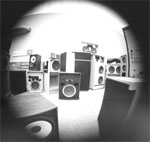I've been slowly upgrading all my speaker wire to 12 ga. Then I began thinking : Soooo, I've got 12 ga going right up to the binding posts on the speakers, but when internal wire connects from the binding posts up to the drivers is smaller, don't I make somewhat of a self defeating line or bottleneck ?
I opened up an OHM today and stripped it all apart. The factory wire was 18 or 20 ga (not marked) , but in good condition. Pulled it all out and replaced with 12ga monster from binding posts to drivers (there is no xover). Of course the wiring runs, connectors, etc were not ready for this upgrade, so it took a while.
Finished up the one speaker and will do the other maņana.
Put power to them and the one with replaced wiring now sounds cleaner (for lack of better word). I don't want to use "the veil has been lifted" analogy. BUT, I did have to reduce treble tone control.
So the question is...did the improvement come from newer wire or better than factory installed wire ? (the monster 12 ga. is prolly 10 y.o. and the factory wire at least 30 y.o.)




 Reply With Quote
Reply With Quote




 reply comes to no absolute conclusion. I would say that corroded wire is degraded compared to non-corroded wire. If you get shiny clean copper when stripping insulation off a wire, it is likely just fine regardless of age. I've read that corrosion of silver wire doesn't matter, since oxidized silver (silver oxide) is a good conductor of electricity. As for aluminum, who knows? I'd be interested to hear what does change in copper wire if it does get old. I've never seen this question addressed before anywhere, it is a good one.
reply comes to no absolute conclusion. I would say that corroded wire is degraded compared to non-corroded wire. If you get shiny clean copper when stripping insulation off a wire, it is likely just fine regardless of age. I've read that corrosion of silver wire doesn't matter, since oxidized silver (silver oxide) is a good conductor of electricity. As for aluminum, who knows? I'd be interested to hear what does change in copper wire if it does get old. I've never seen this question addressed before anywhere, it is a good one.










 ]
]

